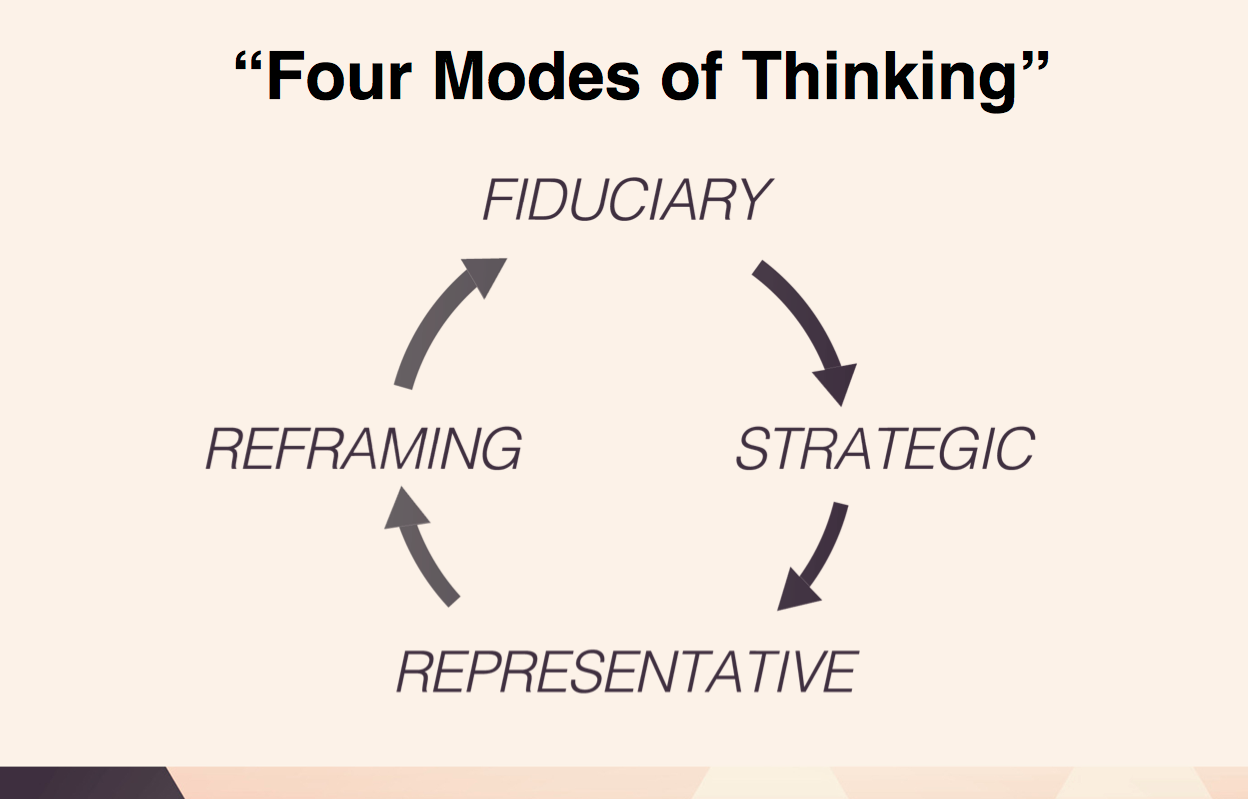I have been thinking recently about healthy and maturing boards of governance for ministry organizations, including local church boards and college boards of Trustees. Increasingly I am convinced that healthy and maturing boards have a balance in the board membership between four modes of thinking about board governance: fiduciary, strategic, representative, and reframing. When boards are comprised of a predominance of one of these four modes of thinking, then the board, and organization, suffers.
Most of us serving on boards would like to think that we are strong in all four areas. What we need to increasingly realize is that we need people who “think” differently than we do to insure that the balance required for healthy and maturing boards is present. We prefer to serve with people who think and act like us! One sure sign of a strong board is when one member says to another, “I don’t understand what you are saying, but I think it is important, and I need to listen to your perspective. Help me understand.”
These four modes of thinking and governance may be briefly summarized as follows:
FIDUCIARY MODE: The word, “fiduciary” is a legal term. It’s goal is to insure the legal and financial integrity of the organization. Being a fiduciary implies that the board serves as a steward of the mission and the future of the organization, and its tangible assets. This mode insures that appropriate audits are performed, and focuses on issues such as Articles of Incorporation/By-laws/Required Government Documents/Payroll and Insurance documentation/Property, Legal, and Financial compliance/Board minutes, and mission clarity.
STRATEGIC MODE: In this mode of thinking, the board serves as planning partner with church, college or ministry organization leader. Being “strategic” implies that the board is proactive and intentional in strategic planning for organization. The board does not necessarily prepare the strategic plan for the organization, but assures that one is current and serving as a roadmap for the future. This mode focuses on mission/vision/priorities/strategic initiatives/ timeline/personnel and budget.
REPRESENTATIVE MODE: This mode of thinking represents the legal and moral owners of the organization. The “representative” thinker especially appreciates the heritage of the church, college, or ministry organization. This mode of thinking serves as the “guardian” of values in the organization. In this mode of thinking, the board remembers why the organization was founded, and seeks to “conserve” the organization’s founding purpose.. History is important to the “representative.”
REFRAMING MODE: This mode of thinking seeks to “ reframe” the presenting problem, and “make sense” of the issues by connecting the dots. The “reframer” tries to identify the “big” picture or issue, and seeks to serve as a “problem-framer.” Often, this mode of thinking will attempt to “re-envision” the situation with implications for the future. Thinking in this mode often compels the board to “restate” the presenting problem in a “big-picture” context.
The model of the “Four Modes…” clearly indicates the cyclical relationship of this way of thinking in board meetings. It is not linear in nature. Issues can arise in any of the four areas. Important, however, is that these four dimensions, expressed appropriately with civility and care, and a “laser beam” commitment to the organization’s vision, most often brings out the best in the board and provided for a more thoughtful, collective response to the agenda issue.
I welcome your comments to this blog either in the comment section on the blog, or to me directly at lfairbanks@boardserve.org.






